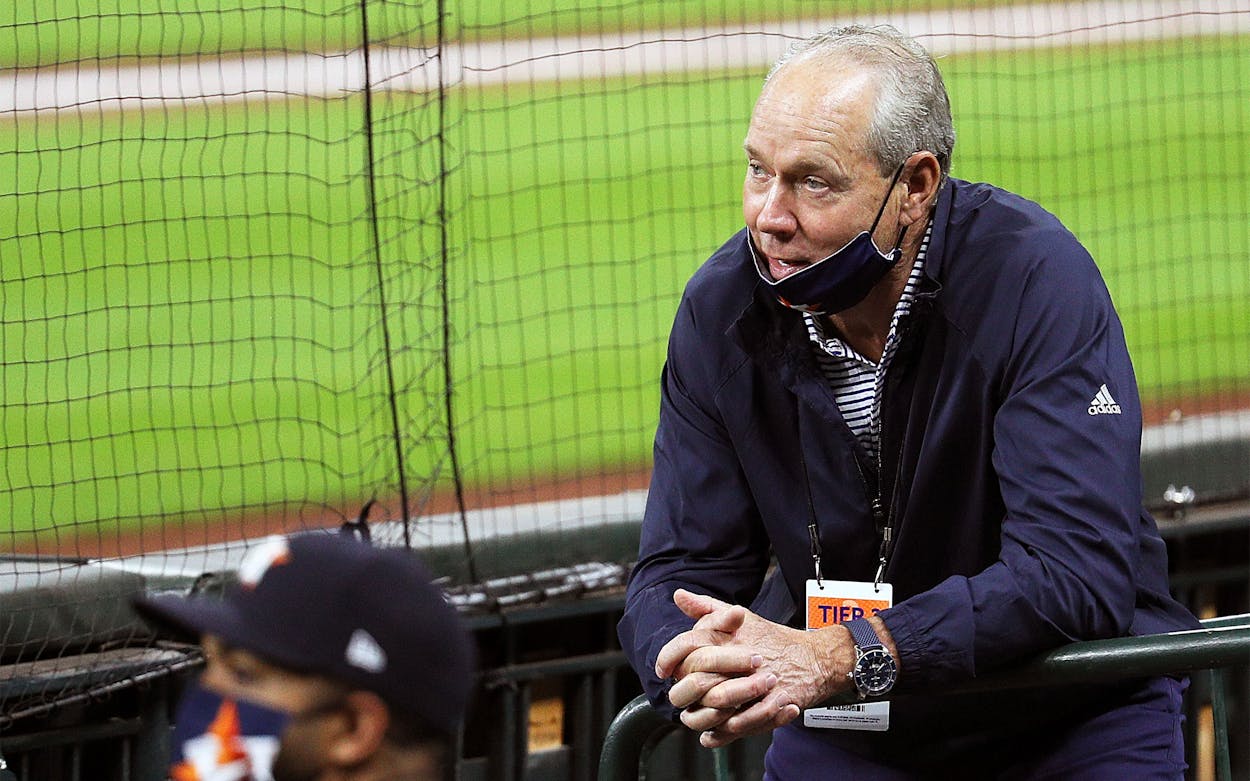On Friday, Houston Astros owner Jim Crane decided to give a long, rambling, lunchtime interview to USA Today’s Bob Nightengale. Over a meal of salmon, Crane aired his grievances with the reputation his team acquired over the past ten months. Specifically, the Astros’ sign-stealing scandal resulted in an asterisk forever being applied to the team’s 2017 World Series win, and a bizarre locker room outburst directed at a group of female reporters led to the ousting of one of the team’s rising young executives, even as management screamed “fake news.”
Crane, of course, had the option of saying nothing. Back in March, with spring in the air and baseball about to begin, it was impossible to imagine that any story could be bigger than what would happen when the Astros returned to the field. The team had just shuffled its leadership, and beloved hometown heroes like José Altuve had been recast as villains. In late February, fans were betting on how many Astros players would be hit by pitches that season. What could possibly be a bigger story than a disgraced team of once-scrappy underdogs returning to face their critics in every city, in stadiums full of booing fans?
Then, of course, the global pandemic happened. The Astros’ return to the field barely registered outside of baseball’s most diehard fans and the occasional opposing pitcher. Even sports reporters who couldn’t have imagined a bigger story than the Astros just a few months earlier turned their attention to, say, a bunch of players for the Miami Marlins testing positive for the virus, or games being canceled because of an outbreak among the St. Louis Cardinals. There were no booing fans on opening day. Instead, stadiums were populated with cardboard cutouts, who have no feelings one way or another about sign-stealing or trash-can banging.
Given everything that’s been going on, it’s baffling that Crane gave an interview to USA Today in which he addressed his team’s cheating in such clear and unambiguous terms as “Listen, it’s always going to be whatever you want to call it” and “I don’t know what else they want us to do. I mean, you couldn’t do a lot more.” Truly moving stuff.
He talked about a situation that occurred in the fall, after the Astros won the pennant. Brandon Taubman, a now former assistant GM, decided to address a controversial personnel decision to bring in pitcher Roberto Osuna by screaming at a group of female reporters in the clubhouse, including one journalist who had previously written about the team’s choice to sign a player who was available only because he’d been suspended from the Toronto Blue Jays for domestic violence. “I’m so fucking glad we got Osuna,” he shouted at the reporters, leading to yet another controversy and, eventually, Taubman’s ouster. In the interview, Crane expressed sympathy—for Taubman, and not the reporters he shouted at, nor victims of domestic violence.
“He just made a comment,” Crane said. “It’s nothing you can defend. He had a few cocktails. He was happy.” Crane “hate[d] to see him lose his job,” but told Nightengale that the team had no choice, and that he was surprised that it became an issue in the first place. “We didn’t anticipate the Osuna thing would catch that much heat,” he said.
Crane opened up on the culture of impunity in the organization that allowed for an elaborate operation to steal signs from opposing pitchers and for Taubman’s outburst. Any larger problem, he said, simply didn’t exist. “We didn’t have a culture problem,” Crane said. “They’re isolated incidents that are unrelated.” Other teams, Crane was quick to point out, did the same thing. The biggest regret he expressed on that front? “Banging on trash cans? You could have found a better way to do it.”
And on, and on. 2017 is a tainted season, Crane acknowledged, but he bristled at critics who’ve suggested that the seasons that followed were invalid, too. If the Astros had won the World Series last October, he suggested that it would have vindicated the team’s decision to run a large-scale sign-stealing scheme. “I sure would have liked to have won because it would have kind of cleaned up things for us. People say we were still doing things in ’18 and ’19. We weren’t doing anything in ’19,” Crane said, curiously suggesting—contrary to the investigation conducted by Major League Baseball—that the Astros stopped cheating after the 2017 World Series win.
Crane did apologize, several times, during what was otherwise a defensive interview. “We’re sorry,” he told Nightengale. “We apologize. I guarantee you it will never happen again. Just give us another chance.” Still, dropping those apologies in an interview where the regrets you express are that your team “had no choice” but to fire an exec who yelled at reporters in the clubhouse, or that you didn’t figure out a more sophisticated way to cheat, doesn’t really read like contrition.
The whole thing is odd, especially given that there is still a global pandemic happening right now. Jim Crane doesn’t have to make public appearances, and nobody would have found his absence curious. He could just be at home, quietly watching the team compete for first place in the AL West. It would have been more respectful to fans who care about his team, to those who would rather not hear what a great guy the fired exec is, and to those who want to just enjoy some baseball during a chaotic and stressful time.
- More About:
- Sports
- Houston Astros
- Jim Crane
- Houston








